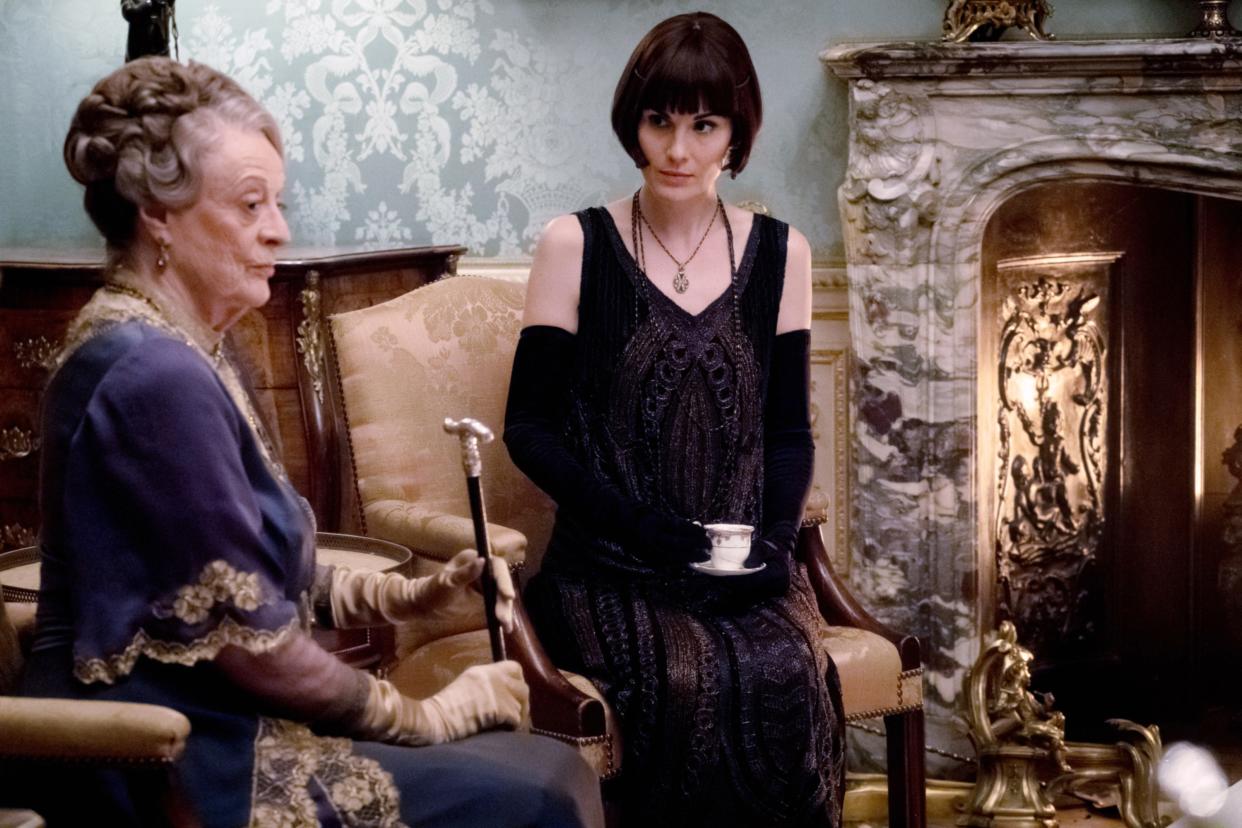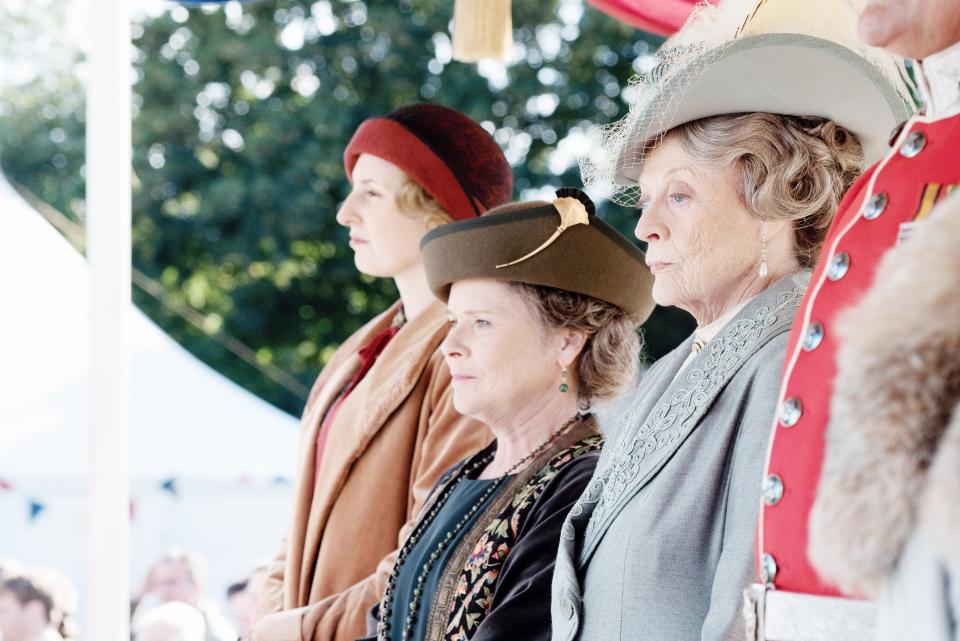Does she live or die? What the 'Downton Abbey' movie reveals about the fate of Maggie Smith's dowager countess

After this weekend, it’s no longer a question of if we’ll return to Downton Abbey — but when. The feature film spin-off of the beloved British series grossed $31 million from stateside Anglophiles, who eagerly lined up for a return visit to the Crawley family estate. (The film has already banked an additional $12 million from international markets where it opened the previous week.) But the next Downton film will almost certainly be missing a key cast member: Maggie Smith, whose brilliantly acerbic Dowager Countess Violet Crawley is the person we all want to be when we grow up. According to reports, the British acting icon was the last cast member who agreed to reprise her role for the movie, then declined to do the press rounds, and at one point had even joked that the feature would have to start with her alter ego’s funeral.
As it turns out, Lady Violet is alive and well … for now, anyway. Towards the end of movie, she shares a tender scene with her granddaughter Lady Mary (Michelle Dockery) that effectively functions as Smith’s farewell to the franchise. While the rest of the Crawley clan attend a lavish reception for England’s king and queen, the dowager countess reveals that she’s been diagnosed with a case of a rapidly approaching demise. “Save your tears for something sad, because there’s nothing sad here,” Violet tells Mary. “I have lived a privileged and an interesting life, and now it’s time to go. I’m leaving the family and the place that I treasure in talented hands.”
Those hands don’t belong to her son, Robert (Hugh Bonneville), by the way. Rather, she knows that Mary is going to be the real force behind Downton’s future, as the 1920s near their end and a brave new world emerges on the horizon. Speaking with Yahoo Entertainment before the film’s release, Downton Abbey mastermind Julian Fellowes—who wrote the film version—declined to say whether that speech represents Lady Violet’s final words. But he did confirm that the movie is first and foremost designed to position Mary as Violet’s true heir.

“She’s the future of the place,” he explains. “Robert is increasingly taking a backseat, which is why I think the house might survive. It very much depended on who was in charge during those difficult years after the 1920s … and I think Mary is tough. She’s not just attuned to modern consciousness, but she also understands the tradition of those places. I like that combination.”
Behind the scenes, Fellowes left the task of tempting Smith back for one last round up to Downton’s producer Gareth Neame. “In the end, Maggie felt she didn’t want to not be a part of it,” the writer says now. “When everyone else gradually fell in and it was ready to go, I don’t think she wanted to feel left out. She had been one of the leaders of the group over the years so it would’ve seemed a shame.”
It also would have have been a shame for viewers to miss out on Lady Violet’s deliciously delivered insults — a role that will presumably fall to Mary going forward. “Mary s similar to Violet in that they both want their own way, but they don’t want to [lose] their position in society. They want to be respected figures, but at the same time doing it in their own way. In other words, having their cake and eating it, too. They’re both determined not to give in either. They won’t give uptimes their positions, but they also won’t give up doing their own thing.”
Even though a Lady Mary-led Downton is Fellowes’s endgame, it won’t happen overnight; the writer says that another movie would only leap ahead a few months, rather than a few years. (That would also allow them to draw out the dowager countess’s death sentence should Smith decide to join in the fun one more time.) “I’m not a great believer in letting the characters age too much. I mean, the story so far has only covered 15 years — from 1912 to 1927 — and we've taken 10 years to do it. So the difference between artificial time and real time has not been very great, and I would like to keep it that way. I don't really believe in latex and graying hair and all that stuff.”
Besides Mary’s ascension, Fellowes teases that various romances that began in the current Downton movie could continue in future installments. Seven years after the death of his beloved Lady Sybile, strapping chauffeur-turned-estate manager Tom Branson (Allen Leech) feels his heart once again stirring at the sight of Lucy Smith (Tuppence Middleton), the maid of one Lady Bagshaw (Imelda Staunton), who turns out to have higher-born origins. “I was very pleased to give Tom a love story, because Sybil died some time ago, and he never really had a [romance] after her death. When I was reviewing the end of the series, I was made aware of the fact that the lives of the others had been tied up, but we hadn't done anything for Branson. He was just sort of spinning in the void.”
An even sweeter romance blossoms downstairs between Downton’s butler Thomas Barrow (Robert James-Collier) and the king’s royal dresser, Richard Ellis (Max Brown). “I was pleased to do that,” Fellowes says. “I was also careful, though, to not over-romanticize the situation, because being gay in 1927 was extremely difficult, and I hope Barrow’s storyline reminds people of that. There’s no reason to believe that there was a smaller percentage of gay people in 1927 than there are now. The different was that most of them had to live a lie. I think it’s good to remind the younger generation of that reality. Rob was quite pleased that Barrow could have that moment, because he'd had rather a hard time of it during the series.”
Downton Abbey is playing in theaters now. Downton Abbey: The Complete Limited-Edition Collector’s Set, which features the full TV series, is available on DVD from Amazon.
Read more from Yahoo Entertainment:
Get an exclusive taste of the official 'Downton Abbey' cookbook with 2 afternoon tea recipes
Binge Guide: The 10 Best #PoorEdith Episodes of 'Downton Abbey'


